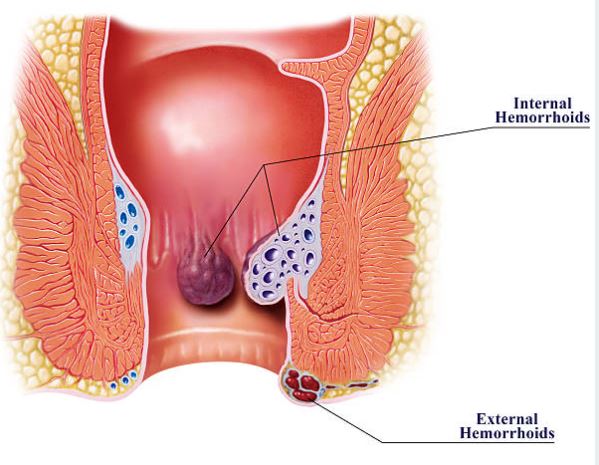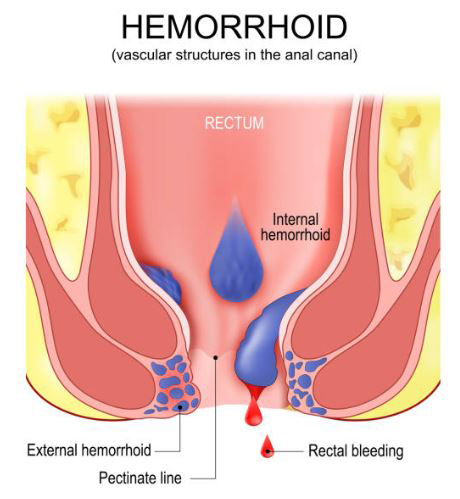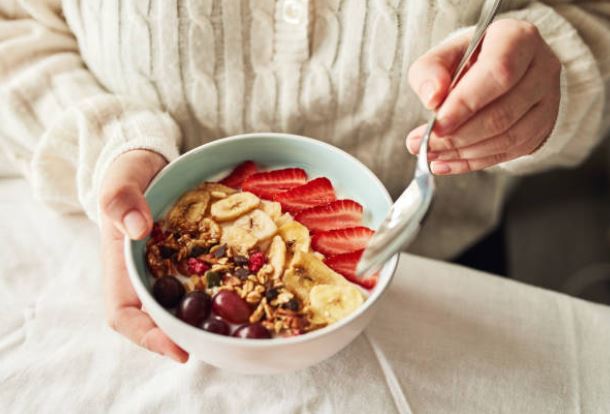Piles or Hemorrhoids
What is piles?
Piles or Hemorrhoids, is a medical condition characterized by swollen and inflamed veins in the anal region. It can occur in different sizes and may develop either internally or externally. Internal hemorrhoids are located approximately 2 to 4 centimeters above the anal opening, whereas external hemorrhoids are found at the margin of the anus.

How can diet assist in managing and preventing piles?
Piles, or hemorrhoids, can arise due to heightened pressure in the lower rectum caused by various factors:
- Including straining during bowel movements,
- Prolonged sitting on the toilet,
- Chronic constipation or diarrhea, and a low-fiber diet.
Therefore, consuming foods that are high in fiber can potentially alleviate symptoms of piles and help prevent their occurrence.
Fiber intake can offer several benefits, such as
- Increasing water retention in the colon and boosting stool bulk.
- This can aid in easing bowel movements and reducing the strain on the rectum, potentially minimizing the risk of developing piles.
Therefore, incorporating fiber-rich foods into your diet, such as fruits, vegetables, whole grains, and legumes, may be beneficial for managing and preventing piles.
What are the types of food recommended for managing piles?
There are two types of fiber that can aid in managing piles – soluble fiber and insoluble fiber.
Soluble fiber forms a gel-like substance when dissolved in water, which helps to soften the stool and make it easier to pass.
Insoluble fiber does not dissolve in water but adds bulk to the stool. It is recommended that an individual consumes 25 to 30 grams of fiber per day, with at least one-third of that fiber being soluble.

However, consuming excessive amounts of fiber can cause gas and bloating. Drinking plenty of fluids, such as water, can also aid in the smooth passage of stools. Drinking at least 8 to 10 glasses of water daily is important to help manage and prevent piles.
What are some foods that can help prevent or manage piles?
Foods that are high in fiber can be particularly helpful in preventing or managing piles. Here are a few examples:
- Wheat bran and shredded wheat: Eating 1/4 to 1/3 cups of ready-to-eat bran cereal that is rich in fiber (containing 9.1 to 14.3g of fiber) such as wheat bran and shredded wheat can help prevent hemorrhoids. Similarly, eating 1 to 1 1/4 cups of shredded, ready-to-eat bran cereal that contains 5 to 9 grams of fiber can also be useful in preventing piles. These cereals are a good source of insoluble fiber, which helps to make the stool bulkier and easier to pass.
- Apples: Apples are a rich source of fiber, especially when eaten with the skin. The skin of an apple contains about 4.4g of fiber, much of which is insoluble fiber. This type of fiber helps to bulk up the stool and has a laxative effect, making it easier to pass. As a result, apples are often recommended as food for managing piles.
- Barley: Barley contains β-glucan, a type of fiber that can promote healthy digestion. When this fiber is broken down in the colon, it forms a viscous gel that helps to soften the stool. This can help to maintain good colon health.
- Lentils: Lentils are an excellent source of fiber, with one cup of cooked lentils containing 15.6 grams of fiber. Other pulses, such as chickpeas, lima beans, and split peas, are also great sources of fiber. Green lentils, in particular, can help to increase the weight of the stool, which reduces the amount of time it spends in the colon.
- Berries: Berries, such as raspberries, strawberries, and blackberries, are a great source of fiber due to their high skin-to-flesh ratio. One serving of berries (100 grams) contains around 6.5 grams of fiber. Berries also have a high water content, which can help to soften the stool and promote smooth digestion. The fructose in berries can also have a natural laxative effect.
- Potatoes: One medium-sized baked sweet potato with skin contains 3.8 grams of fiber, while one medium-sized baked potato with skin contains 3.6 grams of fiber. Potatoes are a good source of both soluble and insoluble fiber, with sweet potatoes having a stronger laxative effect than other vegetables.
- Tomatoes: Tomatoes are rich in fiber and water, which can help ease constipation and make it easier to pass stool. Tomatoes also contain naringenin, a natural antioxidant with a laxative effect that can be beneficial for managing piles.
- Kiwis: Kiwis are another good source of fiber, with one serving containing 3 grams of fiber and a sufficient amount of water. Kiwis act as a natural laxative, increasing stool bulk and easing the passage of stool. The enzyme zyactinase in kiwi fruits can also improve digestion.
- Prunes: Prunes, which are a type of dried plums, are also high in fiber. One cup of stewed prunes contains 3.8 grams of fiber. Eating dried prunes can help maintain a feeling of fullness for longer, reducing the need for frequent snacking. Prunes can also be beneficial for reducing constipation and obesity, which are high-risk factors for developing piles.
- Pears: Pears are an excellent source of fiber, with 6 grams of fiber in one pear with skin. Pears also contain fructose, a natural laxative that can be beneficial for managing piles.
- Corn: Corn has been used as a source of fiber for centuries. One cup of cooked sweet corn contains 4.2 grams of fiber, which can help improve digestive health.
- Oats: Oats are another good source of fiber, with 4 grams of fiber in one cup of cooked oatmeal. Oats can help soften stool and make it easier to pass, reducing the risk of developing piles.
- Whole wheat bread, pasta, and cereals: Whole wheat products are rich in insoluble fiber, which can increase fecal volume and colon transit time. Whole wheat products also contain both soluble and insoluble fibers, which can be beneficial for maintaining digestive health.
- Broccoli: Broccoli contains sulforaphane, which can improve digestion and prevent constipation. Consuming 20 grams of raw broccoli sprouts every day for several weeks can help reduce symptoms of constipation by easing bowel movements and reducing strain.
- Citrus fruits: The inner skin of citrus fruits such as lemons, oranges, and grapefruits contains fiber. These fruits also contain naringenin, a compound with a natural laxative effect. With their high-water content, citrus fruits can soften stools and ease constipation.
- Beans: Peas, pulses, and dried beans are great sources of fiber. A cup of half-cooked beans contains 9.6 grams of fiber, while a half-cup of kidney beans contains 5.7 grams of fiber.
What foods should be avoided for piles?
To prevent the risk of hemorrhoids or piles and alleviate symptoms, it is recommended to avoid foods that are processed, high in fats, sugar, and refined carbohydrates. The following foods should be avoided:
- Processed foods
Frozen and deep-fried foods are difficult to digest and contain unhealthy fats, fewer nutrients, and high amounts of salt, which can cause poor digestion and constipation. - Spicy foods
Spicy foods can cause irritation and inflammation in the digestive tract, making bowel movements painful and aggravating the symptoms of piles. - Alcohol
Reducing alcohol intake is recommended as it can disrupt the digestive balance and lead to dehydration, which can worsen piles. - Dairy products
Consuming dairy products can cause gas, cramps, and constipation, which can aggravate piles. It’s important to keep track of daily dairy consumption and limit it as necessary. - Salty foods
Foods high in salt can affect blood vessels, which can worsen piles. People with piles are advised to avoid salty foods like hams, sausages, and canned foods. - Iron supplements
Iron supplements can also contribute to constipation and aggravate piles. It is advisable to avoid taking these supplements unless recommended by a doctor.
Read Also: 12 Tips to Improve Your Gut Health
To know more about it: Click Here!













